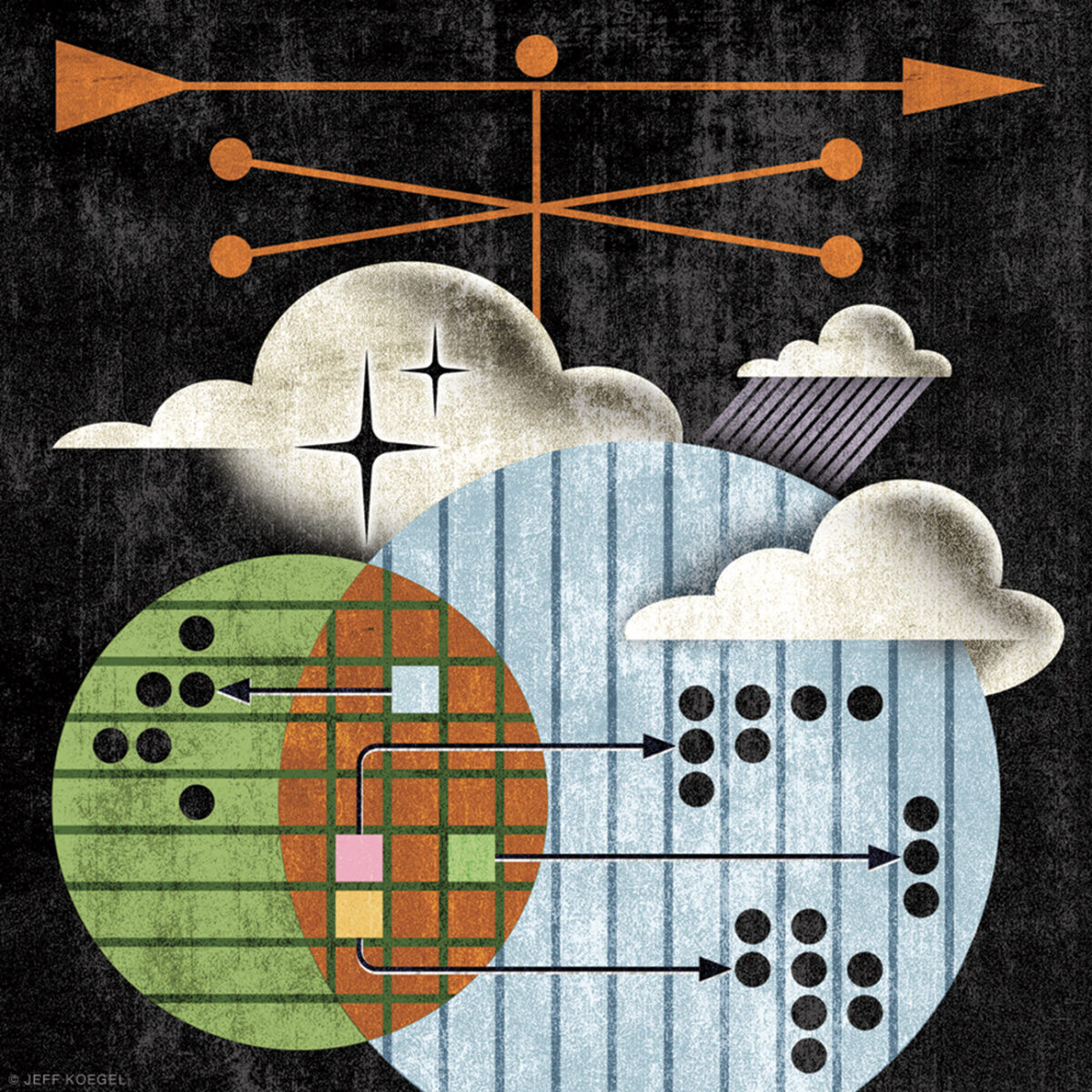
At Perry World House, experts weigh in on the global threats that keep them up at night.
“Leadership really matters. We can put institutions in place, policies in place, regulations in place. At the end of the day, with the right or the wrong leaders, you get very different outcomes,” Perry World House Executive Director Marie Harf was saying, toward the conclusion of the PWH World Today forum in September.
Earlier, Harf had laid out the four “pillars of work” that PWH will focus on this year—democracy, security, climate change, and human rights and global justice—which, she said, “represent both the biggest threats to global stability, but also in which we believe we can make the most significant impact.” She then led a discussion among the PWH affiliates who will be leading work in each area, starting with the question “What keeps you up at night the most?” Here is some of what they covered:
In the security area, Michael C. Horowitz, PWH director and Richard Perry Professor, who recently returned to Penn from government service as the inaugural deputy assistant secretary of defense for force development and emerging capabilities, singled out “promoting and sustaining US political, economic, and military leadership in the face of the challenge posed by the People’s Republic of China” as his chief concern.
While headlines may focus on the wars in Gaza and Ukraine, and the US faces many other security challenges, “the PRC is the only country that presents a short-term and long-term economic and political challenge to US leadership,” he said. “The combination of their desire to become a global leader in artificial intelligence, for example, and their much more repressive vision of what they would do with [AI]—along with their missiles, ship purchases, other military advances—[is] why, in the 2022 National Defense Strategy, the PRC was identified as the ‘pacing challenge’—the thing that the United States needs to focus on the most.”
Among emerging technologies, “AI really lies at the heart of all of it,” he said. “You’re talking about a transformational, general-purpose technology with economic, societal, and military consequences.” Horowitz contrasted approaches to AI in democratic and authoritarian cultures more generally. “In democratic countries, and the United States in particular, we tend to think about artificial intelligence as something to empower people, as we think of our people as the best in the world—and I mean that especially from an American military perspective but also more broadly. Whereas more autocratic countries, they don’t trust their people in the first place. If they trusted their people, they might have different political regimes. That means they’re more likely to try to use emerging technologies to try to control, to try to repress,” he said. “There’s a real contrast in values there.” As a result, “we’ve ended up, in some ways, in what I’d call a competition of coalitions, which is why it’s so important that the United States not only be a beacon of freedom for the world, but a good collaborator and partner with the world.”
Sarah Banet-Weiser, the Walter H. Annenberg Dean and Lauren Berlant Professor of Communication, a media scholar who is leading work on democracy, cited the “normalization of authoritarianism across the world” as “the thing that terrifies me the most right now.”
She highlighted the “enormous role” played by the media in democratic societies in shaping the public agenda and forming public opinion, which “doesn’t just depend on information and sharing news, but also depends on trust and confidence.” But she added that faith in the media has been eroded by factors including “devastating cuts in local and investigative journalism,” the amplification of “polarizing rhetoric and misinformation,” and the concentration of ownership of media platforms by “billionaires who are looking to make a profit” and may not care “whether or not we trust them and whether or not the information is true.”
“Any democracy depends on informing its citizens,” she said. “We teach our students here at Penn to be informed citizens, and we teach them to be discerning when it comes to the media, and to know how to figure out whether or not a message is fake or true, and I think that we need to be ever more vigilant about that,” as AI, for example, makes it harder and harder to tell the difference. “And so media manipulation is an absolutely crucial area for us to contend with if we want to have a healthy democracy.”
That qualifying if is important. “Democratic backsliding is seen to be occurring in an unprecedented number of wealthy countries that once were thought to be immune from those kinds of forces, the United States among them,” she said. While things like civil wars and military coups continue to occur, threats to democracy have increasingly been “emerging from autocratic leaders who leverage democratic institutions like elections, elected officials, legislators, courts, and the media to consolidate this kind of power, and so I think this is something that we need to really be paying attention to in all its elements.”
“When the temperature gets above 35 degrees [Celsius] with 100 percent humidity, that means that we can’t survive outside,” noted Michael Weisberg, PWH deputy director and the Bess W. Heyman President’s Distinguished Professor of Philosophy. “So I think my greatest fear from the climate perspective is that we’re teetering on the edge of that possibility, and that would lead to mass casualty events of the sort that we’ve never seen before.”
In the shorter term, Weisberg lamented that ongoing negotiations and policymaking on climate have somewhat stalled as the world has awaited the outcome of the US presidential election. “Because if it goes one way, then the world will involve US leadership on these issues,” he explained. “And if it goes a different way, then the PRC and other large countries—India, maybe Brazil—have a very different role to play.”
Beyond the election, he pointed to work toward updating the target amount for developed countries to contribute toward climate funding, known as the new collective quantified goal (NCQG). Previously set at $100 billion per year, these funds pay for decarbonization projects like windmills and solar plants, as well as mitigation measures like coastal protection and cooling centers. “The North has just barely started to be able to mobilize that money at the $100 billion level. And now the question is, what happens next?” Weisberg said. “When you have fragile global institutions anyway, and money gets involved, all those issues of trust come up.” An additional challenge this year is that many developed countries that have been “generous with their bilateral development aid have redirected that to go to things like the Ukraine war,” he said.
Two other issues Weisberg cited were adaptation (“how to protect humans and ecosystems and infrastructure and heritage and everything else from adverse climate impacts”) and compensation for loss and damage (“how to deal with unavoided climate impacts”). In the former area, Penn and PWH were involved in work at the COP28 environmental meeting last year [“Gazetteer,” Mar|Apr 2024] to make progress toward goal-setting similar to the 1.5 centigrade limit for global temperature rise, but “there’s got to be a lot more work on articulating what these goals are for protecting humans, ecosystems, infrastructure, and so forth.” The question of compensating for loss and damage is more fraught, he added. There has been “lots of progress, but also an incredibly difficult context, and also incredibly difficult to have hard conversations about this when there’s already a trust deficit” between the developed and developing world.
Zeid Ra’ad Al Hussein, PWH Professor of Practice of Law and Human Rights and the UN High Commissioner for Human Rights from 2014 to 2018, spoke of “the fragility of all of what we hold dear, whether it’s within states or between states,” as his overriding concern. “Everything seems so tenuous and so prone to disruption, and [there’s a] lack of original thinking to overturn this weakness that we see creeping into almost every area of our experience.”
A former UN peacekeeper, Al Hussein contrasted his experience 30 years ago, when forces included robust numbers of troops representing member states “from all corners of the globe” with today’s inability to protect civilians caught in the “horrific” war in Sudan and other conflicts. “We have a sepsis that is spreading through many parts of the world, and the very tools we used to rely on are just not available or seem not to be available,” he said.
Echoing Banet-Weiser, he cited the emergence of authoritarian-minded leaders within democracies as another worry, perhaps even more so than great-power conflicts. Tracing the growth of right-wing populist movements that target immigrant communities in recent decades, he said, “What we have now is the peddling of hatred as a means of shoring up political support for rather mediocre political actors” who have “resorted to rather low sorts of tactics, which, after the Second World War, we hoped had been eschewed and driven out of the political systems, and they haven’t. So, the hatreds are building.”
Al Hussein also called for “much stronger leadership” from the UN. “The leadership is really not there,” he said. While it’s conceivable that the loss of certain parts of the UN wouldn’t cause a major impact, “certainly the specialized agencies, if you saw them degenerate and then die off, the world would be in a very perilous state quickly. The basic architecture of the way that we run governance, beyond the financial systems, would be in deep trouble. And so, there is something that we need to protect.”
In a recent speech to the UN Security Council, Al Hussein recommended that the body “go back to basics,” he said. “In the 1950s when the Security Council was very paralyzed, basically they mandated the Secretary General of the time to go to the hotspot in question, basically see for themselves what was happening, and then come back to the Security Council, to the international community, and say, ‘This is what we need to do to arrest this decline in the security situation,’ and then they would discuss how best to do this.”
That’s not the case now, and “it needs to change,” he said. “With a few changes, it’s amazing what can happen. It’s not so much a system, it’s the right people in the right place. Miracles often happen, and they happen very quickly.” —JP




